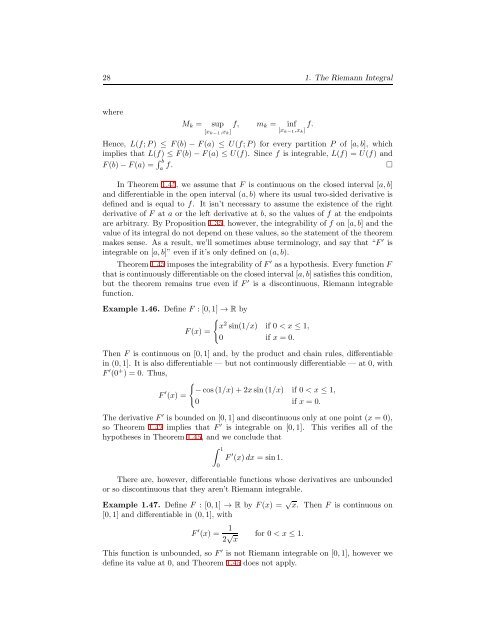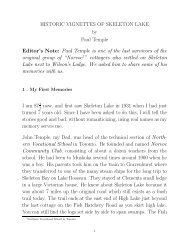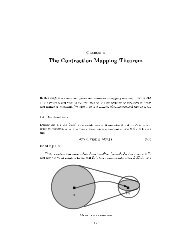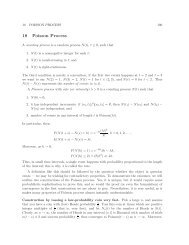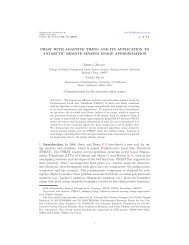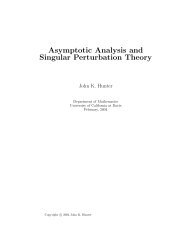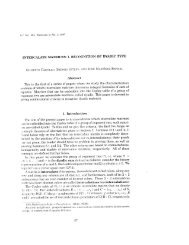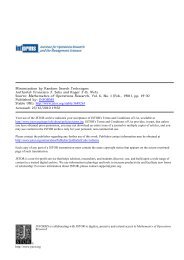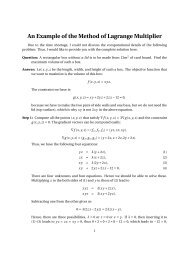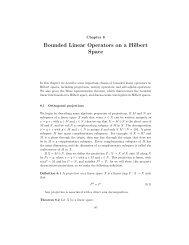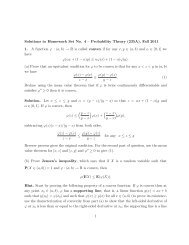The Riemann Integral
The Riemann Integral
The Riemann Integral
Create successful ePaper yourself
Turn your PDF publications into a flip-book with our unique Google optimized e-Paper software.
28 1. <strong>The</strong> <strong>Riemann</strong> <strong>Integral</strong><br />
where<br />
M k = sup f, m k = inf f.<br />
[x k−1 ,x k ] [x k−1 ,x k ]<br />
Hence, L(f;P) ≤ F(b) − F(a) ≤ U(f;P) for every partition P of [a,b], which<br />
implies that L(f) ≤ F(b)−F(a) ≤ U(f). Since f is integrable, L(f) = U(f) and<br />
F(b)−F(a) = ∫ b<br />
a f.<br />
□<br />
In <strong>The</strong>orem 1.45, we assume that F is continuous on the closed interval [a,b]<br />
and differentiable in the open interval (a,b) where its usual two-sided derivative is<br />
defined and is equal to f. It isn’t necessary to assume the existence of the right<br />
derivative of F at a or the left derivative at b, so the values of f at the endpoints<br />
are arbitrary. By Proposition 1.35, however, the integrability of f on [a,b] and the<br />
value of its integral do not depend on these values, so the statement of the theorem<br />
makes sense. As a result, we’ll sometimes abuse terminology, and say that “F ′ is<br />
integrable on [a,b]” even if it’s only defined on (a,b).<br />
<strong>The</strong>orem 1.45 imposes the integrability of F ′ as a hypothesis. Every function F<br />
that iscontinuouslydifferentiableonthe closedinterval [a,b]satisfiesthis condition,<br />
but the theorem remains true even if F ′ is a discontinuous, <strong>Riemann</strong> integrable<br />
function.<br />
Example 1.46. Define F : [0,1] → R by<br />
{<br />
x 2 sin(1/x) if 0 < x ≤ 1,<br />
F(x) =<br />
0 if x = 0.<br />
<strong>The</strong>n F is continuous on [0,1] and, by the product and chain rules, differentiable<br />
in (0,1]. It is also differentiable — but not continuously differentiable — at 0, with<br />
F ′ (0 + ) = 0. Thus,<br />
{<br />
F ′ −cos(1/x)+2xsin(1/x) if 0 < x ≤ 1,<br />
(x) =<br />
0 if x = 0.<br />
<strong>The</strong> derivative F ′ is bounded on [0,1] and discontinuous only at one point (x = 0),<br />
so <strong>The</strong>orem 1.42 implies that F ′ is integrable on [0,1]. This verifies all of the<br />
hypotheses in <strong>The</strong>orem 1.45, and we conclude that<br />
∫ 1<br />
0<br />
F ′ (x)dx = sin1.<br />
<strong>The</strong>re are, however, differentiable functions whose derivatives are unbounded<br />
or so discontinuous that they aren’t <strong>Riemann</strong> integrable.<br />
Example 1.47. Define F : [0,1] → R by F(x) = √ x. <strong>The</strong>n F is continuous on<br />
[0,1] and differentiable in (0,1], with<br />
F ′ (x) = 1<br />
2 √ x<br />
for 0 < x ≤ 1.<br />
This function is unbounded, so F ′ is not <strong>Riemann</strong> integrable on [0,1], however we<br />
define its value at 0, and <strong>The</strong>orem 1.45 does not apply.


